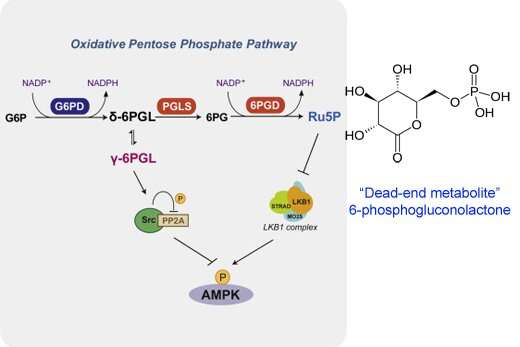
Researchers at Winship Cancer Institute of Emory University have discovered that an apparent “dead end metabolite” has a previously unknown function regulating cell growth. The finding could guide efforts to target cancer cells’ warped metabolism with selective drugs.
The results were published this week in Molecular Cell.
The researchers, led by Jing Chen, Ph.D., have been studying the oxidative pentose phosphate pathway, which supplies both cellular building blocks for rapid growth and a critical internal antioxidant called NADPH. Flow through the pentose phosphate pathway is generally increased in several types of cancer cells.
The first enzyme in the pathway, called G6PD (glucose-6-phosphate dehydrogenase), generates a chemical called 6-phosphogluconolactone, which was thought to be a metabolic dead end. One of the forms of 6-phosphogluconolactone binds and regulates the well-known cellular signaling enzyme Src, the researchers discovered. Binding of 6-phosphogluconolactone encourages Src to inactivate an “off switch” within cancer cells.
In addition, targeting G6PD is only effective in some types of cancer cells with low levels of an enzyme (SOD2) that buffers against oxidative stress. Targeting G6PD does not pinch off growth in other cancer cells with relatively high levels of SOD2. SOD2 levels could be a good marker to predict the response to treatments targeting G6PD, Chen says.
Source: Read Full Article
